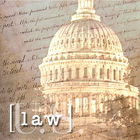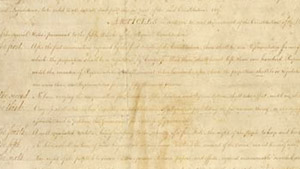
|
1ST AMENDMENT RULING WILL PERMIT GOV'T TO DISCIPLINE EMPLOYEES WHO QUESTION OFFICIAL MISCONDUCT 31 May 2006 The freedom of speech is one of the foundational rights under US constitutional law, as manifest in the First Amendment, because it affords the common citizen a protection against a basic authoritarian abuse of power. For ancient Greeks, parrhesia, or speaking frankly an uncomfortable truth which might accuse those powerful enough to punish the speaker, was a noble trait, something that stood as the mark of a free individual, and which is the philosophical underpinning of American democratic law. A democracy depends on the ability of the people to exert influence over government. The First Amendment is designed to limit the ability of government to exert arbitrary power over the people. It protects the freedom of individuals to speak, of the press to gather and publish information, of "the people peaceably to assemble", the right to practice any religion one sees fit, and importantly the right "to petition the Government for a redress of grievances". The Garcetti v. Ceballos case involved Los Angeles prosecutor Richard Ceballos being demoted as punishment for writing to inform his superiors that a sheriff's deputy had lied to obtain a search warrant. The Los Angeles district attorney's office argued that it has the implicit power to demote or discipline any employee that impedes its power to efficiently carry out its responsibilities, regardless of whether Mr. Ceballos was simply fulfilling his legal obligation to inform his superiors that wrongdoing had occurred. In its 5 to 4 ruling on Garcetti v. Ceballos, the Supreme Court found that the LA DA's office did not violate Richard Ceballos' First Amendment rights, finding that government employees are not protected by the constitutional freedom of speech clause in the First Amendment, while on duty. There is no such distinction made in the language of the First Amendment, and no such distinction made in federal law, but citing a lack of precedent on the issue, the ruling will now stand as a stark precedent and a major departure from the meaning of constitutional liberties as interpreted to date. The court's majority ruled that government at all levels has the right to punish employees who step out of line by criticizing their superiors, reporting official misconduct or raising dissent against a controversial policy. The reason ultimately given for the ruling is sympathy with the government's argument that such dissent inhibits the government's ability to impose its policy choices efficiently. The problem: while specifically claiming not to undermine whistleblower protection laws, it relies on the "strength" of those laws, to override the constitutional element of this ruling, which empowers the government to punish dissenters, so long as their dissent is brought while in the course of their duties. Justice Souter wrote in his dissent that "private and public interests in addressing official wrongdoing and threats to health and safety can outweigh the government's stake in the efficient implementation of policy, and when they do public employees who speak on these matters in the course of their duties should be eligible to claim First Amendment protection." The case is controversial not only because of its content and its First Amendment involvement, but also for the process by which it was heard and decided. It was originally argued on 12 October 2005, but was suspended after Justice O'Connor left the court; when Justice Alito took her place on the court, it was one of three cases slated for 're-argument'. An extra hour of hearings was granted, and a case that appeared to have deadlocked the court before, came to a very controversial 5 to 4 ruling. Alito clearly cast the tie-breaking vote, and the ruling is one of the first clear cases where he has been able to exercise his faith in the "unitary executive", the idea of an implicit power within the executive branch to form a monolithic command structure, free of the traditional checks and balances laid out in the US Constitution. Justice Alito's nomination raised concerns in Washington, because he has defended the government's newly claimed —but legally unsubstantiated— power to seize citizens, designate them as "enemy combatants" —a term without legal basis—, strip them of their rights, hold them without charge, and forbid them access to the US courts. He had argued in the past that neither Congress nor the courts have the right to question decisions by the executive branch to circumvent existing law in the name of national security, and endorsed the Bush administration's claim that a president in wartime has near absolute discretion to decide once and for all the legality of any action, regardless of the law or of judicial precedent. The stamp of this theory, not espoused by anything near a majority or even a substantial or notable minority of legal scholars, is clearly on this ruling. It may become the first clear case where Alito's presence on the court shifts the course of American constitutional and legal history. Steven Shapiro, national legal director of the American Civil Liberties Union, is quoted by the Washington Post: "It is fair to say, in an era of excessive government secrecy, this makes government coverups easier by discouraging whistle-blowers". The ACLU supported the case of Richard Ceballos, demoted as part of what appears to be a cover-up by the LA district attorney's office. The ruling comes at an historically inopportune time, on the same day in fact as news broke around the world that the Pentagon had decided it would hold courts martial against several US marines alleged to have massacred 24 unarmed civilians in Haditha, Iraq, last November. The case has been delayed largely due to an officially-sanctioned cover-up. On 19 November 2005, a convoy of humvees was ambushed, and improvised explosive device (IED) killing one marine. The official story was that the blast kllled 15 Iraqi civilians and that 8 Iraqis were killed in a gunfight that erupted after the ambush. In fact, everything after the IED was a lie. No civilians were killed by the blast, but a roadblock was set up for security reasons. When a taxi full of students pulled up to the roadblock, a group of soldiers, enraged by the IED attack and the loss of their comrade, allegedly opened fire, killing four students. They then went on a rampage from house to house, killing a further 20 unarmed civilians, according to information released to the press and stemming from a Pentagon investigation. That information could now be effectively covered up, simply because there would be no way for active-duty military personnel to bring such information to light without using the official chain of command. If that chain of command is now judicially empowered to punish those who criticize official wrongdoing or crimes by their peers or superiors, it is easy to imagine how situations like Haditha might be covered up in the future. But the ruling in Garcetti v. Ceballos obviously has far-reaching consequences. It could also prevent information becoming public about wrongdoing at regulatory agencies, which would mean the public may be denied information about deliberately lax enforcement or even agency collusion with polluters. Strangely, though the LA district attorney's office argued its right to retaliate against Ceballos, it also denies having done so. Its case has had the strange effect of achieving a major constitutional precedent, which its own description of its activities would seem to nullify. Adding more confusion to the meaning of the ruling, Gene Schaerr, representing the International Municipal Lawyers Association, argues that it simply allows state and local government the authority needed to have "oversight" over employees, while not encroaching on First Amendment rights of those same employees "as private citizens". But the distinction is historic: the Garcetti v. Ceballos ruling states that public employees enjoy no First Amendment protection while on the job. Regardless of whether official crimes occur or whether cover-ups become more commonplace, it means that government will now enjoy the authority it needs to craft a more uniform and deliberate series of arguments about how it can best serve the public, or about how it has done. [s]
BACKGROUND: New information acquired by the ACLU by way of the Freedom of Information Act, shows the FBI and the Joint Terrorist Task Force have been monitoring, infiltrating and spying on innocent, law-abiding individuals and both non-religious and faith-based activist groups whose activities are entirely peaceful and are protected by the First Amendment to the US Constitution. [Full Story] AT&T SUED FOR VIOLATING LAW IN NSA DOMESTIC SPY PROGRAM AT&T was once the nation's telecommunications monopoly, and abuses there led to the break-up of the Bell monopoly and the regulation of telecoms, with the intent of encouraging competition and achieving the goal of forcing providers to serve the customers first. Now, the Electronic Frontier Foundation has filed a lawsuit alleging that the telecommunications giant has violated federal law by assisting the government in spying on innocent Americans without any court authorization. [Full Story] |
|||||||
|
||||||||

